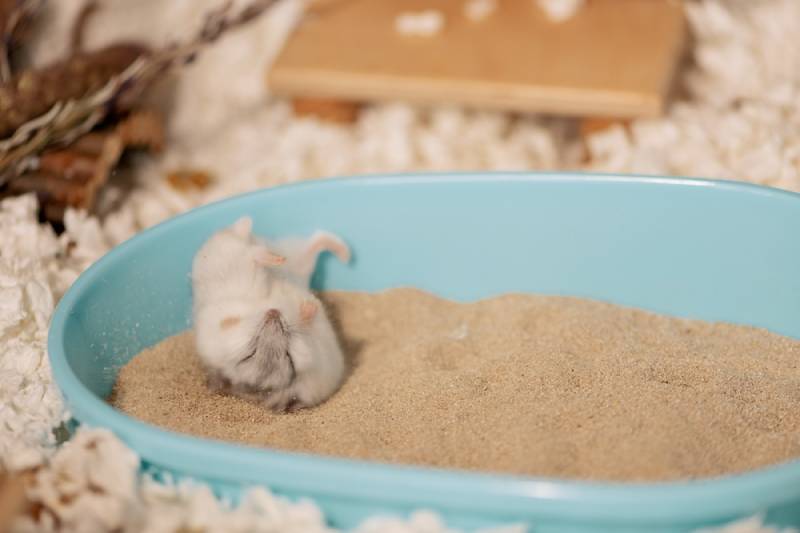Can Hamsters Get Wet? Vet-Reviewed Consequences & FAQ
Updated on

Click to Skip Ahead
Hamsters are adorable rodents that make excellent pets for adults and older children. While they have a short lifespan of 2–3 years, they are relatively easy to care for. Before getting a hamster, one must be educated on how to properly care for a hamster and things to avoid. For example, some hamster owners may wonder if their hamster can get wet. Unfortunately, no, hamsters should not get wet.
Let’s find out why hamsters should not get wet and how to keep your hamster friend healthy and safe.
What Will Happen if My Hamster Gets Wet?
It’s not that hamsters can’t get wet; rather, they shouldn’t get wet. Hamsters are not used to getting wet, and this can potentially cause stress. Their small body size also means that they are quick to lose heat, and can become easily chilled once wet.
Do Hamsters Need Baths?

Hamsters do not need baths. Hamsters are similar to cats in that they groom themselves constantly, so they are extremely clean mammals. Hamsters are nocturnal creatures and are most active at night, so unless you’re a night owl, you may not be aware of your hamster’s grooming habits.
Hamsters can take baths, but not with water. Rather, hamsters take “sand baths”. So, what the heck does that mean? It means hamsters love to roll and dig around in sand, just like their wild ancestors. Sand helps bathe their coats by exfoliating and absorbing oils into the coat and is an essential part of your hamster’s needs.
To provide an appropriate sand bath, ensure that you are only using dust-free, reptile-safe or chinchilla sand. The sand bath should only last about 15–20 minutes, so be sure to remove it from their enclosure once they’re finished.
What Do I Do if My Hamster Gets Wet?
If your hamster gets wet, you must dry them immediately. Towel drying them, with a warm, dry towel, may prove difficult. Instead, grab a box lined with paper towels and gently place your hamster inside, preferably in a warm room—the paper towels will absorb some of the water. Change out the paper towels frequently during this process.
If you can hold your hamster, you can dry them with a clean cotton cloth, but do it gently.
How Do I Keep My Hamster Dry?
Hamsters need available drinking water 24/7, but how do you provide water without the possibility of your hamster getting wet? Luckily, you can buy a no-drip water bottle that attaches to your hamster’s cage, which will keep them dry and prevent accidental spillage. When looking for a water bottle, ensure it’s BPA-free with a chew-proof nozzle, and designed for hamsters. Beware that ball-valve sippers may be difficult for hamsters, so other alternatives such as narrow diameter nozzles and pinched nozzle options may be better.
Never place dishes with standing water in your hamster’s enclosure, especially a deep dish where they could fall in.

Conclusion
If you’ve considered getting a hamster, now you know to keep them dry. Never give your hamster a bath with water. Instead, provide your hamster with reptile sand so your hamster can bathe itself. Remember that hamsters groom themselves constantly and do not require baths. Always provide adequate nutrition for your hamster and utilize your veterinarian as a resource for any questions or concerns you have regarding your hamster.
See also:
- How to Find a Lost Hamster Quickly: 12 Expert Tips
- Can Hamsters Get High? Vet-Approved Facts & Safety Guide
Featured Photo Credit: IRINA-ORLOVA, Shutterstock













